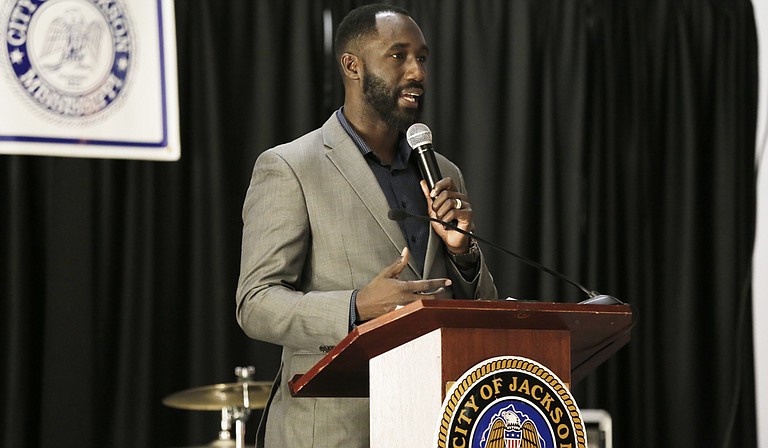Mayor Tony Yarber, speaking at the now-annual Doing Business With the City event at the Jackson Convention Complex, announced what he is calling a side-lot program called Neighbors First. Photo by Imani Khayyam.
Friday, December 11, 2015
Soon, Jackson homeowners who have been keeping overgrown lots near their homes neat and trimmed might be able to reap some reward from all that hard work.
Mayor Tony Yarber, speaking at the now-annual Doing Business With the City event at the Jackson Convention Complex, announced what he is calling a side-lot program called Neighbors First.
Yarber said the program would let city residents acquire abandoned and ignored properties to get them back on the tax rolls and boost revenue for the City.
Homeowners would have the right of first refusal for adjoining lots, and the program would only be open to City residents.
"If you don't live in Jackson, you can't participate," Yarber said.
The mayor said his administration would release full details about the plan in coming days. In November, the Memphis City Council approved an ordinance that allows property owners to earn credits for mowing adjoining government-owned lots. Over time, the owners could apply the credits toward the purchase of the lots.
The Commercial Appeal reported that interested participants in the Memphis mow-to-own plan would pay a $175 administrative fee and receive $25 in credits each time he or she mows the grass, up to $1,350. If the value of the property exceeds that, the landowner pays the difference.
Neighbors First is part of the Yarber administration's overhaul of handling blighted properties, which included moving code enforcement under the purview of the police department.
New rules for the U.S. Department of Housing and Urban Development that take effect in 2016 would allocate money to states to "increase and preserve the supply of decent, safe, and sanitary affordable housing for extremely low- and very low-income households, including homeless families."
Published in October 2014, a study of an area of west Jackson between Highway 80, Fortification Street, Ellis Avenue and Gallatin Street found that empty lots and lots with abandoned structures comprised 41 percent of the land in the study area.
The study, which Voice of Calvary Ministries and Duvall Decker Architects completed, found that the state of Mississippi, Jackson State University and City of Jackson were the three largest owners of vacant lots in their study area.
Jackson Ward 4 Councilman De'Keither Stamps said work has been taking place behind the scenes for a while, and his office has started mapping his south Jackson ward. Stamps said a public-education campaign should take place so citizens know the program works and that proper controls need to be put in place to, for example, make sure that people actually live in the City before they obtain land.
"I'm glad (that) we're at the point where we can vote on it soon," Stamps said.

Comments
Use the comment form below to begin a discussion about this content.
Sign in to comment
Or login with:
OpenID